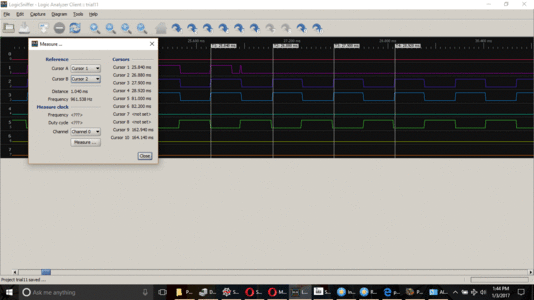Difference between revisions of "Blinking Blues"
Russ hensel (talk | contribs) |
Russ hensel (talk | contribs) |
||
| Line 47: | Line 47: | ||
== More Results in Files == | == More Results in Files == | ||
| − | * Arduino Code -- I keep adding to it, but the old subroutines that have been timed are not changed. | + | * Arduino Code -- I keep adding to it, but the old subroutines that have been timed are not changed. It consists of 4 files that need to be unzipped into a directory called Blinkers and then opened with the arduino software. It is hosted on a google drive at: [https://drive.google.com/file/d/0B4yCTDKKk1cYUnV1MkRuZ0p6VzQ/view?usp=sharing Blinkers] |
| − | * Results spreadsheet | + | * Results spreadsheet: contains some of the measurements I have taken from the logic sniffer. It is in open office format. |
| − | * Sniffer project files. | + | * Sniffer project files. They are all zip and hosted on a google drive at: []. These files can be opened with the logic sniffer software found at [https://www.lxtreme.nl/ols/#download Logic sniffer software download] |
= Test Setup = | = Test Setup = | ||
Revision as of 14:15, 3 January 2017
Having some trouble with arduino blink. Will write up here. Draft now, not enough to really be of use to anyone but me.
Contents
Origin
I have been messing about with steppers and simple drivers for some time. Recently I put a logic analizer into use and noticed that the switching wave forms were a bit off. Simplifying this I went back to the basic blink and took a look at it. It also had some anomolies. This began an investigation of various blink code and the results. So far I have not found code that gives good results. In this investigation I am focusing on using pulses with half periods of 500 and 5000 micro ( not milli ) seconds.
Blink
What I Expect
The blinks I worked with for this investigation were all in the 1 to 10 ms or so period time frame. I used only the microsecond built in functions. I expected that the timings would:
- be repeatable in the range of a few microseconds.
- be accurate in the range of 10 to 20 microseconds.
What I Found
- I found glitches in the waveform of up to 1 or more milliseconds ( 1000 microseconds )
- Often the glitches would repeat every 81.92 milliseconds or so. Interestingly enough if I divide this time by 16 e6 I get 512 which is more or less a magic number.
What I Tried
- Different arduino boards
- Different pins
- Different implementations of blink
- Interrupts on and off
Issues Investigated
- Was the logic sniffer the glitched one: Do not think so, I generated a square wave on an ossicalator at 1KHz ( period 1 ms ) and looked for glitches in it. Nothing found.
Things Yet to Try
- More boards
- Different builds of the arduino software
- More pin variations
- Check unused pins, perhaps change all to output low....
Some Results
In the image below the data from the arduino is being measured on channel 3, the test signal from the oscillator is on channel 5 and the rest are grounded or some sort of junk I have not gotten rid of. Click on it to go to a page with the image and then again to go full size which I did not do here to reduce the clutter.
More Results in Files
- Arduino Code -- I keep adding to it, but the old subroutines that have been timed are not changed. It consists of 4 files that need to be unzipped into a directory called Blinkers and then opened with the arduino software. It is hosted on a google drive at: Blinkers
- Results spreadsheet: contains some of the measurements I have taken from the logic sniffer. It is in open office format.
- Sniffer project files. They are all zip and hosted on a google drive at: []. These files can be opened with the logic sniffer software found at Logic sniffer software download
Test Setup
Logic sniffer is the dangerous prototypes single board device http://dangerousprototypes.com/docs/Logic_Sniffer_101
Measurement taken using the cursor measurement, finding some good pulses at the beginning and then visually scanning, then measuring for bad pulses later on. All recorded to a spreadsheet, that will be uploaded here.
